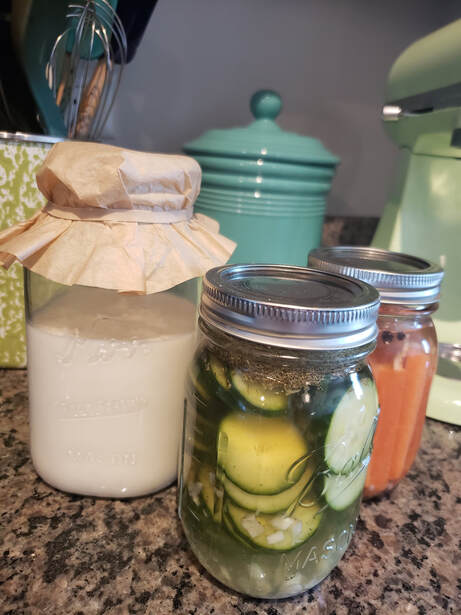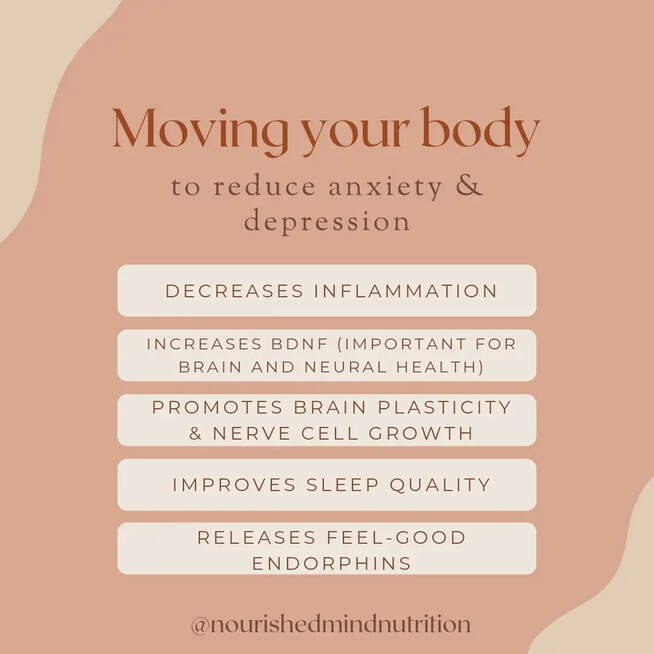 I call it "slow food." In our busy culture, it can be challenging to find the time and energy to be involved in the preparation of our food. Fermented foods are one example of this. Kefir and lacto-fermented veggies are what I've got going on my kitchen counter today! We know fermented foods are amazing for us and there is tons of evidence to support their role in improving gut health, mental health, and even longevity. It's totally ok to buy these things from the store, but the benefits of doing it yourself are huge and go way beyond the superior microbial content that you get from doing it in your own kitchen. It's all about rebuilding that connection between ourselves and our food. As a mental health and gut health dietitian, I truly believe this: the more involved you are in growing and preparing the food you eat, the better your food will make you feel. The nutrients and probiotics in "slow food" are nourishing and healing. So is the process. Want to learn more? If you have any questions, feel free to comment below or message me directly. If you’d like more personalized guidance, schedule a virtual appointment or a free 15-minute discovery call with me! I’d love to work with you. Erica Golden, RDN, LD, IFNCPRegistered Dietitian Nutritionist
0 Comments
 For mild to moderate depression, studies show that moving your body can be AS GOOD AS an anti-depressant. For severe depression, it is a an amazing adjunctive therapy. Studies have been done with lots of different types of movement, and the best thing seems to be the thing you enjoy - the thing you can stick to. ⚽️🧗♀️⚾️🏊♀️👨🦽🏈💃🎳⛸🎿🥋🚴♂️🏋♂️⛹🚣♂️ A variety of different types of movement can be wonderful, too, for your overall health. Multiple different brain regions, including the prefrontal cortex, the anterior cingulate, the corpus callosum, the cingulum, and the hippocampus are often smaller in people with major depression. But guess what?! Exercise has been shown to boost brain plasticity and increase BDNF levels, a brain chemical that encourages neural growth in these very areas. 🧠💪 And did you know that just 20 minutes of movement RIGHT NOW could impact your mood almost immediately? It's hard to find anything that is that effective that quickly. 🙌 Want to learn more? If you have any questions, feel free to comment below or message me directly. If you’d like more personalized guidance, schedule an appointment or a free 15-minute discovery call with me! I’d love to work with you. Sources: PMID 29122145, PMID 31389872 Erica Golden, RDN, LD, IFNCP@nourishedmindnutrition  It's one of the most common refrains from anyone in the field of nutrition and wellness: "Eat more whole foods." But what exactly counts as a "whole food"? It's a fair question. And one person's definition of a whole food may be different from the next person's. And I think it's important to say at the outset that just because something isn't a whole food doesn't mean it can't still have some health benefits. But let's talk first about what we can all agree that a whole food isn't. Whole foods are not the highly processed foods that make up most of packages lining the aisles of the grocery store. They are not the foods with lots of ingredients, most of them unpronounceable. The category of whole foods doesn't even include some of the foods that carry health halos today, like gluten-free baked goods or cauliflower pizza crust or organic granola or keto protein bars. However, being processed isn't always a sign that a food isn't a whole food. Washing and chopping and bagging kale is technically processing kale. Canned sardines, shelled pecans, frozen berries, milled flour - all are processed, but all are still whole foods. It's less a question of whether or not the food is processed, and more a question of whether the plant or animal part that the food was made from is recognizable. (I often use Cheetos as an example of this. I remember wondering what on earth they were until I finally looked at an ingredient label while studying nutrition in college. They bear absolutely no resemblance in either appearance or flavor to corn.) A whole food also has all of the components that make the plant or animal itself nutritious. For example, whole grains keep their husk and germ. Oranges keep their fiber. Potatoes keep their skins. Milk keeps its fat. (Foods lose a lot of their nutritional value when we process them too much - especially the fiber, phytochemicals, vitamins, and minerals.) A whole food also ideally doesn't have added ingredients that aren't naturally present in the food, such as stabilizers, colorings, flavorings, gums, etc. Some additives aren't harmful and can actually increase the nutrient-density of the food- such as adding vitamin D to milk or mixed tocopherols (vitamin E) to oils - but I think we can all agree that we want less added sugar, salt, artificial colors and flavors, and gums in our foods. Next time you're at the grocery store, try spending a few extra minutes in the produce section. (It's the section of the store that's the most packed with whole food options!) Wherever you have a choice between a whole grain product or a refined grain product, choose the whole. Opt for foods that are less-processed, recognizable for the ingredients they contain, and nutrient-dense. If you can plant a garden, plant fruits, vegetables, and herbs that grow well in your area. When you do buy things that are processed in some way or contain multiple ingredients, think about what has been done to the food and whether it's something you could do at home in your kitchen. If so, it's most likely a whole food as well. A few examples of foods that are less-processed and more nutrient-dense:
You get the idea. As always, there's a balance here. There's no benefit to you if you're fearful or anxious about eating processed foods. You don't win any prizes for eating 100% whole foods, and trying to do better at choosing more nutritious foods is not the same as creating "food rules" about what you can and can't eat. You don't have to label yourself as being on a "whole foods diet" or make yourself feel guilty every time you eat something that is highly processed. It's about eating well, enjoying and being grateful for your food, doing more in the kitchen when you can, eating more plants, listening to your body, being compassionate to yourself and others, and using food as a tool to improve your health rather than as an implement of punishment or guilt. Want to learn more? If you have any questions, feel free to comment below or message me directly. If you’d like more personalized guidance, schedule an appointment or a free 15-minute discovery call with me! I’d love to work with you. Erica Golden, RDN, LD, IFNCP@nourishedmindnutrition |
AuthorErica Golden, RDN Archives
March 2024
Categories |
 RSS Feed
RSS Feed
